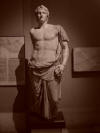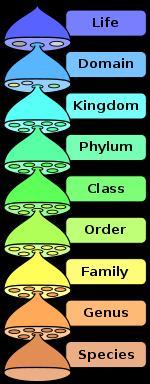|

ARISTOTLE
(384 – 322 BCE)
LIFE
|
 |
|
Aristotle
(384–322 BC) was a Greek philosopher, a
student of Plato, and teacher of Alexander
the Great. He was among the greatest
polymaths of all time. His fields of
expertise included: philosophy, logic,
poetry, theater, music, rhetoric, politics,
ethics, biology, and zoology.
|
|
Alexander the Great
(356-323 BCE) |
|
Maps of War |
KNOWLEDGE
1. He was an empiricist (All
knowledge comes from experience.).
Biology, not
math, is the model for knowledge.
Knowledge
begins by experiencing particulars.
2. Life requires an organism.
Man is
mortal.
|
 |
Domain:
Eukaryota
Kingdom: Animalia
Phylum: Chordata
Class: Mammalia
Order: Primates
Family: Hominidae
Genus: Homo
Species: Homo Sapiens
|
In the West, logic was first
established as a formal discipline by Aristotle.
It's the branch of philosophy that studies valid
reasoning. The study of logic also features
prominently in mathematics and computer science. See
page 79 of your book.
CATEGORIES
|
CATEGORIES |
DESCRIPTION |
EXAMPLES |
|
Substance: Primary
Secondary |
Particulars
Universals |
Socrates, Plato, Dick, and Jane
man, tree, animal, plant etc |
| Quantity |
Size, extension |
John is 5'10" |
|
Quality |
Properties |
Red, smart, sharp, furry |
|
Relation |
How objects are related |
Taller, left, right, top, near,
far |
|
Place |
Location |
Athens, Greece |
| Time |
When |
384–322 BCE |
|
Position |
Posture, attitude |
Lying, sitting, standing |
|
State |
condition |
Armed, sleeping, awake |
|
Action |
To make or do |
Running, walking, working |
|
Passivity |
To suffer or undergo |
Imprisoned, restrained, fired |
The Nicomachean
Ethics
The Nicomachean Ethics are the
lecture notes of his son Nicomachus.
GOLDEN MEAN
1.
Everything aims at the good - Telos.
2. Happiness
is the highest good.
3. Virtue is
happiness - the realization of our essential
nature.
Good habits
facilitate virtue.
4. Man
is the rational animal, so virtue is rational
activity.
5. Virtue is
the mean between two extremes (relative to us).
Everything
in moderation.
The
moderate life is the rational life, and the good
life.
6.
Some acts are inherently bad.
| |
DEFICIENCY |
MEAN |
EXCESS |
|
EATING:
|
anorexia |
temperance |
bulimia
|
|
FEAR: |
brave /
foolhardy |
courage |
coward |
|
CONFIDENCE: |
self
conscious |
confident |
vain |
|
HONOR: |
humility |
pride |
arrogance / vanity |
|
BELIEF: |
narrow-minded |
open-minded |
gullible / naive |
|
SPENDING: |
stingy |
liberality |
wasteful |
|
ANGER: |
doormat |
easygoing |
irascible |
|
EMOTIONS:
|
Spock / stoic |
Christ |
Richard Simmons |
|
FAIRNESS: |
mercy
(not
giving one's due) |
justice
(giving
one's due) |
vengeance
(giving one's undue) |
|
PLEASURE: |
stoic |
temperance |
intemperance |
Intellectual virtue
is governed by the intellectual part of the soul.
There are two types of intellectual virtue -
practical and theoretical wisdom.
Practical wisdom concerns objects that change. Right
actions are governed by practical wisdom. Practical
wisdom determines what means are best suited for any
given ends. Practical wisdom leads to moral virtue.
This seems to
indicate that we are free to choose our ends, and
reason tells use what is the best means to achieve
those ends. That would be a relativist
position, but Aristotle says
that these ends are unfixed. The ultimate
human end is not subject to the changing norms of society.
Our final end is
happiness. Happiness is universal to every human
being.
Theoretical wisdom
governs objects that are unchanging, and it is the
ultimate virtue. Reason is our highest
faculty.
The Good is what we're seeking. Happiness is our
ultimate end because all things aim at it. It is
activity in accordance with virtue. Virtue is the
excellence of a thing to perform its function.
Reason is our ultimate function. Happiness is the
realization of our rational nature. A virtuous
person lives in accordance with reason - to realize
our rational potentiality.
The soul has a
rational & non rational part. The non rational part is
desire. The rational has two parts; they are sophia
and phronesis. Sophia is intellectual wisdom. Its
objects are unchanging. Phronesis is practical
wisdom. Its objects are changing. Practical reason
controls our desires. When appetites and
desires are under rational control the result is
moral virtue. This occurs when we follow the mean
between two extremes. These extremes are vices, and
they are caused by irrationality.
ABSTRACT
Book I
The good is what all
things aim. Everything we do aims
at some end (good). The final end of everything we
do is the good.
Happiness is the
highest good. It's the end of all action. We choose knowledge,
honor, pleasure, and virtue for themselves, but also
for happiness. We choose happiness for itself, but
never for something else.
Happiness could be
(1) pleasure, (2) honor (3) virtue, (4) wealth, and
(5) the contemplative life:
(1).
Happiness is not pleasure:
A life of pleasure is
suitable for lower animals.
Mill, Freud, and
Aristotle think happiness is the end of action.
Aristotle does not
think that it's pleasure.
Mill and Freud think
it's pleasure because pleasure is desired in
itself, and never for something else, so
pleasure is the final end.
(2). Happiness is
not honor.
Honor depends on
other people.
(3).
Happiness is not virtue.
Virtue is compatible
with suffering.
(4).
Happiness is not wealth.
Wealth is desired for
happiness.
(5). An child
or ox cannot be happy.
The essence of a
thing resides in its function.
Man is the rational
animal, so
the function of man is reason.
Happiness is virtuous activity.
Happiness is virtue.
Virtue is acquired by
habit.
|